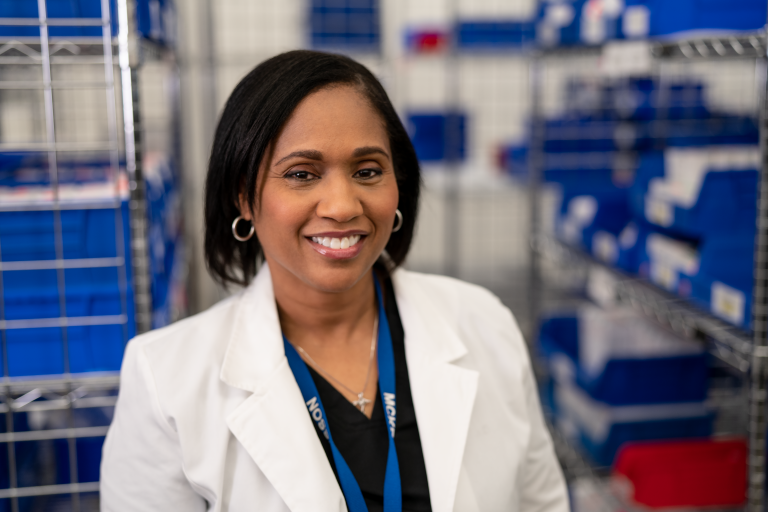
Research shows that Biologics by McKesson’s pioneering risk-based care program maximizes patients’ time on therapy, leading to better oncology patient outcomes. Now, its partnership with Arine is enabling it to take risk-based care a step further.
When cancer patients take advanced therapies that are designed to fight their disease, they may experience significant side effects that diminish their quality of life. Symptoms like nausea or fatigue may become too overwhelming for some patients, leading them to skip doses rather than report their discomfort to their provider.
Now, new research from an oncology & rare disease focused specialty pharmacy, Biologics by McKesson (Biologics), and Arine, a medication intelligence company, shows that patients who receive personalized symptom management counseling from their dedicated oncology specialty pharmacy nurse stay on therapy longer and have better health outcomes.
Three years ago, Biologics launched its innovative risk-based care program to help cancer patients who are at high risk of nonadherence to better manage their symptoms, enabling them to remain on therapy for as long as the therapy is clinically effective.

The risk-based care journey begins when a pharmacist conducts a risk assessment with the patient to identify any barriers to treatment before receiving therapy.
If Biologics’ proprietary risk assessment shows that the patient is at high risk of nonadherence, they receive holistic, personalized care, including educational and emotional support, through regular phone contact with a dedicated nurse. After learning about the oncology patient’s unique challenges with remaining adherent, the nurse creates an individualized care plan to help the patient continue therapy by finding workable solutions for their circumstances.
“If the specialty pharmacy can have an impact on helping patients make it through side effects that we know come with almost every cancer therapy, we know the patient may stay on therapy longer.”
“If the specialty pharmacy can have an impact on helping patients make it through side effects that we know come with almost every cancer therapy, we know the patient may stay on therapy longer,” says Ela Lourido, Vice President and General Manager, Specialty Pharmacy Services. “The biggest concern is that oncology patients discontinue therapy earlier than they should have, or before it is clinically necessary.”
This personalized risk-based approach has helped patients remain on therapy longer, improving patient outcomes and reducing overall cost to healthcare.
Now, Biologics is building the future of risk-based care. Recently, it partnered with Arine, a medication intelligence company, to create a more advanced risk-based care program that could benefit an even greater number of oncology patients who may be at risk of nonadherence.
Improving risk-based care with AI, data, and clinical expertise
Arine helps clinicians deliver personalized care by combining artificial intelligence, data science and clinical expertise. It turns patient health data, medication dispensing information, and demographics into behavioral insights and actionable recommendations that help to improve patient health outcomes and quality of life.
Biologics partnered with Arine to analyze its risk-based care model and advance the clinical care it provides to patients. Arine analyzed Biologics data for patients who took Lynparza (olaparib) between January 2020 and June 2022. Of the high-risk patients, 29.1% received personalized care plans.
Improving oncology patient outcomes: Nearly two months longer on therapy

Arine’s independent analysis found that Biologics patients in the Risk-Based Care program with documented care plans stayed on therapy for significantly longer periods than patients without care plans—6.7 months, versus 4.9 months —and were at lower risk of discontinuing treatment. Biologics patients whose nurses helped them resolve symptoms or facilitate dose modification remained on therapy two to three times longer than other patients.
In April 2023, Biologics and Arine launched a pilot program for Biologics patients who are beginning Lynparza therapy. Its goal is to create care plans for more patients by optimizing the risk-based care workflow and allowing the program to become more scalable.
“By leveraging the assessment data to generate actionable recommendations and automate the creation of a risk-based care plan.”
Before Arine’s involvement, Biologics nurses created care plans for high-risk patients individually, a time-consuming process. In this pilot, Arine’s technology will streamline the process, creating automated risk-based care plans that are tailored to a patient’s unique symptoms. If a patient experiences nausea, for example, guideline-based recommendations will automatically populate that patient’s care plan, so the nurse doesn’t have to input the information into the plan.
“By leveraging the assessment data to generate actionable recommendations and automate the creation of a risk-based care plan,” says Yoona Kim, CEO of Arine, “we free up nurses to focus on the patient counseling instead of the documentation aspects.”
Creating a new model for the future of risk-based care

For the first three years of Biologics’ risk-based care program, patients identified as high risk for nonadherence received enhanced clinical care indefinitely.
In that time, Biologics learned that the need for risk-based care is fluid and that constantly assessing oncology patients is a superior way to determine who would benefit from a care plan.
Arine’s dynamic risk profiling process helps to identify patients who need extra help, as well as those who may no longer need this enhanced support at any given time. This personalized, data-driven approach means that each patient receives the support they need, exactly when they need it.
“They can have a care plan until they resolve those symptoms,” Lourido says. “If they have no symptoms left, they go back down into a steady state, and they’ll continue to be assessed. If something else bubbles up, we can create a new care plan and give them the interventions they need.”
“Technology has the potential to transform how we deliver individualized care for patients, which ultimately leads to optimized outcomes on therapy.”
Biologics is hopeful that by combining its own patient data with Arine’s artificial intelligence, technology, and clinical support, it will revolutionize the way Biologics delivers care to oncology patients. The goal is nothing less than to become a true extension of the patient’s multidisciplinary care team.
“This is the natural evolution, which is using all our resources to make sure the clinical program is as good as it can be,” Lourido says. “Technology has the potential to transform how we deliver individualized care for patients, which ultimately leads to optimized outcomes on therapy.”